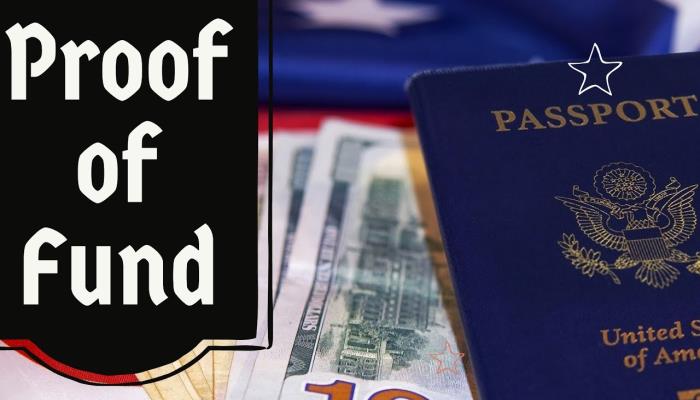Proof of Funds for US Student Visa

Proof of funds is a requirement for obtaining a USA student visa, particularly if you don’t have a prospective employment opportunity. It is essential for the US consulate to verify that you have the financial means to support yourself during your study period. There are different situations, like visa interviews or university requests, where you might need to demonstrate proof of funds. Regardless of the requester, it’s crucial to present the proof in a way that assures them you can cover the costs of studying abroad.
Need for proof of funds for a US student visa
The necessity for proof of funds for US student visa stems from broader concerns. Firstly, US immigration aims to ensure that you possess the financial capability to support yourself throughout your study period in the country. Moreover, proof of funds is mandated for various reasons, including:
- Visa requirements: When applying for an F1 visa to study in the USA, presenting proof of funds is a crucial documentation requirement.
- Financial responsibility: Some universities impose the necessity of submitting financial proof to assess your ability to complete your studies without significant financial concerns.
- Government regulations: The immigration department requires proof of funds to verify your capacity to sustain yourself in a foreign country, preventing you from becoming a burden on the host country.
Documents required as Proof of funds for US student visa
The US government places emphasis on easily accessible funds, such as those in savings and checking accounts that can be readily liquidated when needed. They specifically look for assurance that you have sufficient funds for your first year of school and the capability to secure more for the duration of your degree. Documents accepted as proof of funds for USA student visa requirements include:
- Bank Account Statements: These documents, provided by your bank, detail your account transactions over a specific period, demonstrating financial consistency that indicates your ability to sustain yourself in the USA.
- Loan Approval Letter: An official document from a lender confirming approval for a loan, specifying terms and conditions, serves as confirmation of the loan’s approval and can be submitted as proof of funds.
- Sponsor Letter: Issued by a bank based on your financial history and assets offered as collateral for a loan, a sponsor letter is akin to a capacity certificate and represents a financial commitment, although it doesn’t directly reflect money in your account.
- Income Tax Return (ITR): This document showcases your financial standing and income history, serving as proof of funds for the USA when applying for purposes like a visa or admission.
- Fixed Deposits: A Fixed Deposit (FD) can be submitted as proof of funds, indicating a stable financial position. The bank statement reflecting the FD demonstrates a committed amount of money set aside for a specific period.
- CA Certificate: Some countries may require a CA Certificate prepared by a certified Chartered Accountant (CA). This document outlines the actual assets and liabilities of the student or sponsor, covering current and fixed assets with estimated values, signed and stamped by the CA.
Documents not accepted or rejected as Proof of funds
Certain documents are typically not accepted as proof of funds for USA student visa financial requirements, primarily due to their inherent characteristics that make them less reliable in demonstrating immediate and liquid financial capability. These documents include:
- Stocks & Bonds: The fluctuating values and market-driven nature of stocks and bonds make them unreliable as proof of funds, as their worth can change rapidly.
- Real Estate: Property deeds and real estate holdings are generally not accepted because of the illiquid nature of these assets, making it challenging to access immediate funds.
- Fixed Assets: Assets such as machinery, equipment, or vehicles are not considered proof of funds, as their conversion into readily available cash poses difficulties.
- Income/Salary Slips: While income or salary slips reflect earnings, they are not accepted as proof of funds because they do not demonstrate the actual availability of liquid assets for immediate use.
To secure an F1 student visa, it is essential to furnish bank statements that are 6 to 9 months old, showcasing convincing financial proof of funds to sustain your education and living expenses in the USA.
It is critical to ensure that the amount presented aligns with or exceeds the I-20 requirement when submitting financial documents. This sum should encompass tuition fees and living expenses for the initial year of your university program. It’s important to note that demonstrating sufficient financial support plays a crucial role in the approval of your F-1 visa. As an illustration, if your I-20 mentions a first-year requirement of USD 25,000, you should exhibit financial documents reflecting an amount close to USD 38,000.
It’s worth noting that when submitting bank statements for a US student visa, it is imperative to exhibit a minimum funding amount covering one year of tuition fees and living costs for international students studying in the USA. Additionally, meeting the financial requirements for the F-1 visa involves providing supporting documents, including proof of funds as indicated in the I-20 form.
Effectively presenting compelling financial proof during a visa interview is paramount for a successful outcome. This comprehensive guide offers guidelines that, when followed, allow you to showcase your financial capability to support yourself throughout your stay abroad.
Obtaining an education loan for studying abroad is a significant decision, and the choice of the lender plays a pivotal role in this process. Making a well-informed decision involves a thorough assessment of the loan terms and services offered by different lenders. It is crucial to carefully consider factors such as interest rates, repayment terms, and any additional fees associated with the loan. This careful evaluation ensures that you select a lender whose offerings align with your financial needs and preferences.
Moreover, when opting for an education loan, it is advisable to explore various financing options and compare them to find the most favorable terms. This may involve consulting with financial advisors, researching online resources, and seeking recommendations from those who have previously pursued education loans for international studies.
By approaching the decision-making process with diligence and thorough research, you enhance your chances of making a well-informed choice regarding an education loan. This, in turn, strengthens your overall visa application by demonstrating a thought-out and sustainable financial plan for your academic pursuits abroad.


